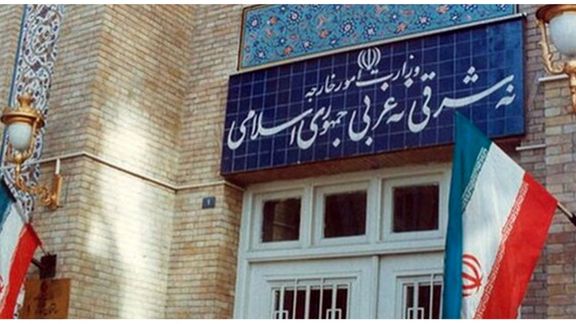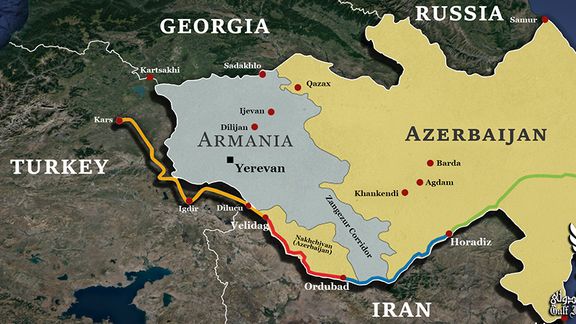Iran's overture to Ukraine an affront to Russia?

Iran congratulated the “government and people of Ukraine” on their Independence Day. Some have interpreted this as a response to Russia’s recent shift of policy about the Zangezur transport corridor.

Iran congratulated the “government and people of Ukraine” on their Independence Day. Some have interpreted this as a response to Russia’s recent shift of policy about the Zangezur transport corridor.
The congratulatory message was posted by the official account of the Islamic Republic’s foreign ministry on X Saturday. Although not unprecedented, the message this year has angered pro-Russia ultra-hardliners in Iran. They accuse the ministry of “humiliating” the country and interpret the move as “self-abasing signals to the West”.
Similar congratulatory messages were sent to Ukraine in 2021 and 2022, but none was extended in 2023. Relations between Tehran and Kyiv have deteriorated significantly since the Revolutionary Guard (IRGC) shot down a Ukrainian airliner in January 2020, killing all 176 people on board. The situation has further worsened due to Tehran's provision of hundreds of Shahed suicide drones to Moscow over the past two years, which have been extensively used to target civilian infrastructure and urban centers in Ukraine.
Pro-Russia ultra-hardliners who are already critical of the newly appointed foreign minister, Abbas Araghchi, and accuse him of following a “diplomacy of indignity” as opposed to his predecessor’s “dignified diplomacy”, have strongly criticized what appears to be an overture to Ukraine on social media.
“Araghchi has revived the diplomacy of humiliation right away!! The congratulatory message on the Independence Day of Ukraine, despite this country’s hostility to Iran and when it is at war with the Russians on behalf of the West, has an important message to the West and Russia!!,” an angry ultra-hardliner took to X to complain.
Nevertheless, some hardliners on social media have defended the foreign ministry’s move and argued that Russia should be rebuked because, as reported by Azerbaijani media, the Russian Foreign Minister Sergei Lavrov supported the establishment of a Zangezur corridor during Vladimir Putin’s recent visit to Baku.

Baku has been demanding a corridor southern Armenia to connect Azerbaijan’s proper with its Nakhchivan enclave separated by Armenian territor. Moscow and Baku want Russia to monitor and control the corridor, but Yerevan and Tehran are opposed to such a scheme, and argue that even if a transport route were to be established, Armenia should have control over it.
“Observance of Russia’s current behavior indicates that Moscow is probably anticipating some kind of control over Zangezur corridor and reviving its influence in the Caucasus which albeit will not be an easy task,” moderate conservative Entekhab news website which called it “Putin’s green light for geopolitical suffocation of Iran”.
Entekhab suggested that the Islamic Republic not delay launching diplomatic efforts to avoid the loss of its current “geopolitical advantage” threatened by the establishment of the transport corridor.
Iran has always opposed the establishment of the transport corridor which will eliminate Iran's direct access to Armenia, if the corridor is not controlled by Yerevan. In a meeting with Armenian PM Nikol Pashinyan on July 30, Supreme Leader Ali Khamenei reiterated Iran's opposition to Zangezur corridor which he said the Islamic Republic considers it “detrimental” to Armenia’s interests.
It is not clear if the congratulatory message to Ukraine was because of a rift between Tehran and Moscow, or simply an attempt to somewhat improve Islamic Republic's image under a new president.
In December 2023, Moscow also repeated its support for negotiations between Iran and the UAE over the three disputed Islands of Abu Musa, the Greater Tunb, and the Lesser Tunb in the Strait of Hormuz, infuriating the Islamic Republic. Tehran summoned the Russian envoy after Moscow signed a joint statement with Arab nations calling for negotiations.
Russia’s long delay in signing a 20-year comprehensive cooperation agreement with Iran despite the aid Iran has offered to Russia in its war against Ukraine has also irritated the Islamic Republic.